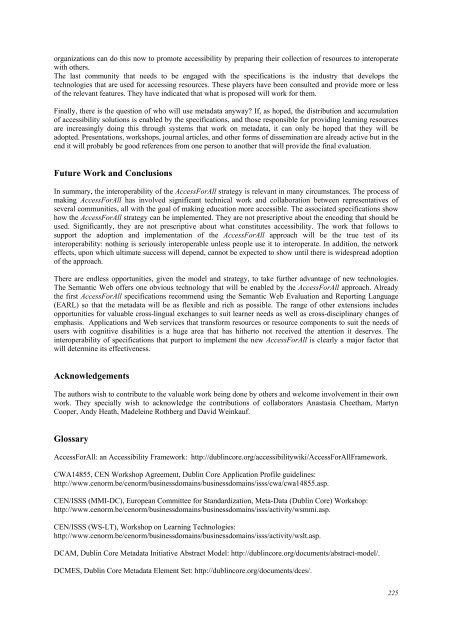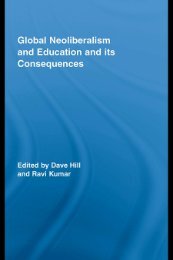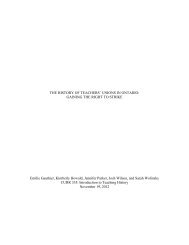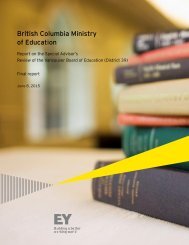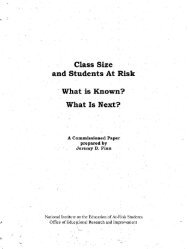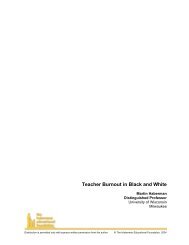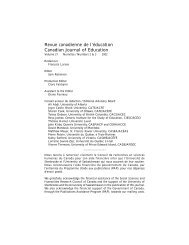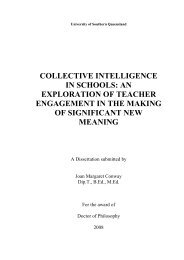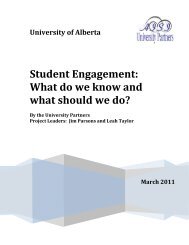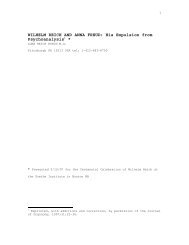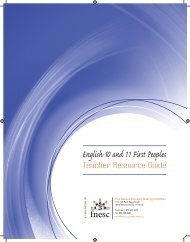October 2006 Volume 9 Number 4
October 2006 Volume 9 Number 4
October 2006 Volume 9 Number 4
Create successful ePaper yourself
Turn your PDF publications into a flip-book with our unique Google optimized e-Paper software.
organizations can do this now to promote accessibility by preparing their collection of resources to interoperate<br />
with others.<br />
The last community that needs to be engaged with the specifications is the industry that develops the<br />
technologies that are used for accessing resources. These players have been consulted and provide more or less<br />
of the relevant features. They have indicated that what is proposed will work for them.<br />
Finally, there is the question of who will use metadata anyway? If, as hoped, the distribution and accumulation<br />
of accessibility solutions is enabled by the specifications, and those responsible for providing learning resources<br />
are increasingly doing this through systems that work on metadata, it can only be hoped that they will be<br />
adopted. Presentations, workshops, journal articles, and other forms of dissemination are already active but in the<br />
end it will probably be good references from one person to another that will provide the final evaluation.<br />
Future Work and Conclusions<br />
In summary, the interoperability of the AccessForAll strategy is relevant in many circumstances. The process of<br />
making AccessForAll has involved significant technical work and collaboration between representatives of<br />
several communities, all with the goal of making education more accessible. The associated specifications show<br />
how the AccessForAll strategy can be implemented. They are not prescriptive about the encoding that should be<br />
used. Significantly, they are not prescriptive about what constitutes accessibility. The work that follows to<br />
support the adoption and implementation of the AccessForAll approach will be the true test of its<br />
interoperability: nothing is seriously interoperable unless people use it to interoperate. In addition, the network<br />
effects, upon which ultimate success will depend, cannot be expected to show until there is widespread adoption<br />
of the approach.<br />
There are endless opportunities, given the model and strategy, to take further advantage of new technologies.<br />
The Semantic Web offers one obvious technology that will be enabled by the AccessForAll approach. Already<br />
the first AccessForAll specifications recommend using the Semantic Web Evaluation and Reporting Language<br />
(EARL) so that the metadata will be as flexible and rich as possible. The range of other extensions includes<br />
opportunities for valuable cross-lingual exchanges to suit learner needs as well as cross-disciplinary changes of<br />
emphasis. Applications and Web services that transform resources or resource components to suit the needs of<br />
users with cognitive disabilities is a huge area that has hitherto not received the attention it deserves. The<br />
interoperability of specifications that purport to implement the new AccessForAll is clearly a major factor that<br />
will determine its effectiveness.<br />
Acknowledgements<br />
The authors wish to contribute to the valuable work being done by others and welcome involvement in their own<br />
work. They specially wish to acknowledge the contributions of collaborators Anastasia Cheetham, Martyn<br />
Cooper, Andy Heath, Madeleine Rothberg and David Weinkauf.<br />
Glossary<br />
AccessForAll: an Accessibility Framework: http://dublincore.org/accessibilitywiki/AccessForAllFramework.<br />
CWA14855, CEN Workshop Agreement, Dublin Core Application Profile guidelines:<br />
http://www.cenorm.be/cenorm/businessdomains/businessdomains/isss/cwa/cwa14855.asp.<br />
CEN/ISSS (MMI-DC), European Committee for Standardization, Meta-Data (Dublin Core) Workshop:<br />
http://www.cenorm.be/cenorm/businessdomains/businessdomains/isss/activity/wsmmi.asp.<br />
CEN/ISSS (WS-LT), Workshop on Learning Technologies:<br />
http://www.cenorm.be/cenorm/businessdomains/businessdomains/isss/activity/wslt.asp.<br />
DCAM, Dublin Core Metadata Initiative Abstract Model: http://dublincore.org/documents/abstract-model/.<br />
DCMES, Dublin Core Metadata Element Set: http://dublincore.org/documents/dces/.<br />
225


